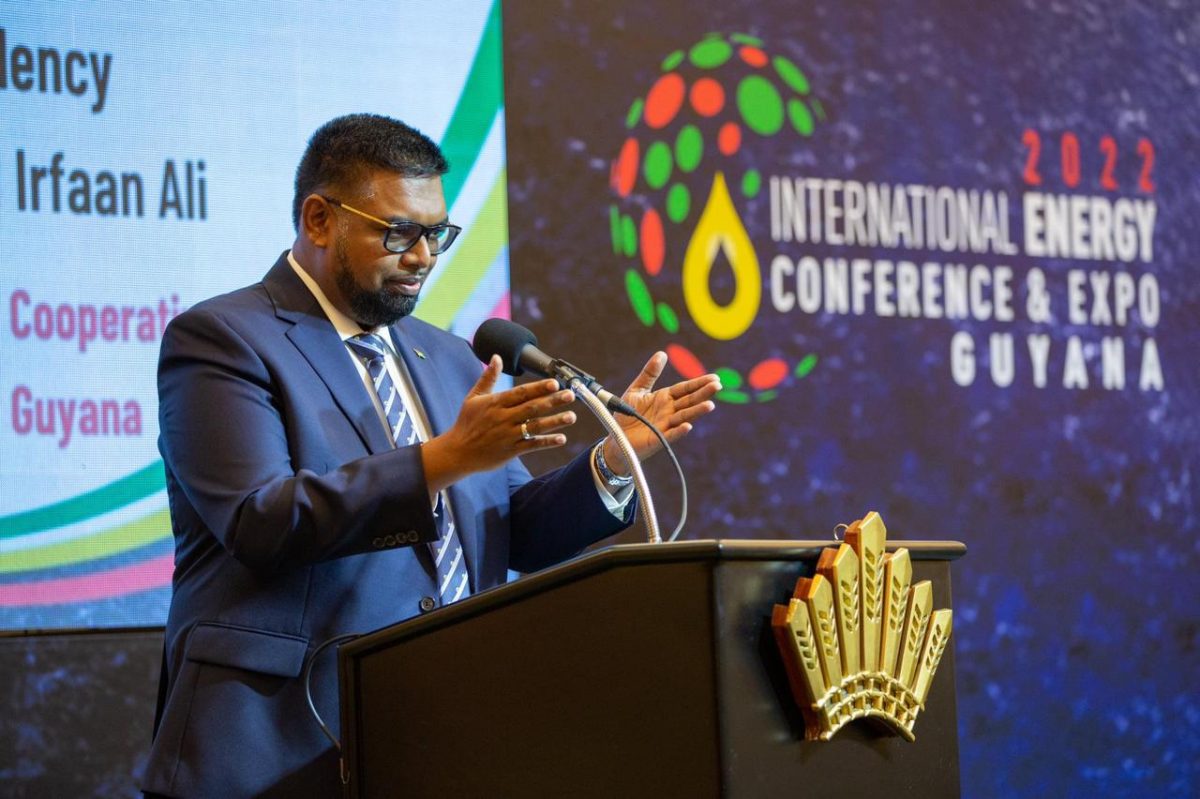A major international energy conference opened this morning at the Guyana Marriott Hotel with President Irfaan Ali and other leaders emphasizing sustainable exploitation of petroleum resources and the switch to green fuels.
Held under the theme “Charting a Sustainable Energy Future”, Ali used his keynote address to commit to sustainable exploitation of resources. He reminded the delegates that the country is committed to environmental preservation in spite of being an oil and gas producer.
The Guyanese leader said that Guyana is open to investors. He said that the resources of the country strategically position it to become a diversified economy. The President outlined the strides Guyana has made in furtherance of its economic development while staying true to its core principles of environmental preservation and regional collaboration.
“Our development strategy is built on a low carbon pathway. The core objective of this strategy is economic sustainability, diversified investment in climate mitigation and adaptation, carbon credit…,” he said.
He added that Guyana is working closely with ExxonMobil to realise its national energy strategy with the development of a natural gas pipeline while also alluding to the exploitation of renewable sources such as solar power and hydropower.
“We will remain uncompetitive if we do not address the cost of energy…we will bring down the cost of energy by 50%,” he committed.
Ali, reminding of Guyana’s international commitment to reducing dependence on fossil fuel, iterated the goal of 90% renewable energy by 2030, adding that the country is not shying away from its international commitment.
Boasting of the “strides” made in the oil and gas sector, the President said that the controversial Natural Resource Fund Act was passed to ensure that there is transparency in the spending of oil revenues.
The Ali administration has been pummelled over what has been decried as an unjust Production Sharing Agreement with ExxonMobil which was struck in 2016. It has also been accused of cozying up to oil and gas investors to the detriment of the environment.
Meanwhile, Surinamese President Chandrikapersad Santokhi in a similar fashion spoke about his country’s movement towards green energy while sustainably exploiting oil and gas resources.
He said that countries must invest in green energy and promote the use of renewable energy resources in all of their ventures.
He spoke about the partnership between Guyana and Suriname in the development of the oil and gas sector. Referencing the recent engagement among Guyana, Brazil and Suriname, President Santokhi said that through collaboration the countries can become the new frontier of sustainable development.
Barbados Prime Minister Mia Mottley said that the Caribbean is a lesson in resilience while outlining the plethora of challenges faced by the region. Speaking to the theme of the conference, the Caribbean leader called for better transitions to sustainable forms of energy.
She said that the region’s leaders need to force the unpalatable conversations onto the international stage to highlight the reality of their countries since they are facing the brunt of the environmental damage caused by the developed, industrialised nations.
Speaking to local content in the Caribbean, Mottley said “The day that we do not provide opportunities for our citizens who participate in active citizenship from being able to benefit from the patrimony of our countries is the day we sow the seed of destruction in our nations”.
Ghanaian President Nana Dankwa Akufo-Addo told the conference that his country shares a lot of similarities with Guyana noting that while the world is advocating for a shift from fossil fuels to more sustainable means, there ought to be transition plans that are realistic.
He explained that the effects of climate change have been catastrophic to the African continent and in order for it adapt to those changes and mitigate the effects some US$3 trillion is needed. He added that in natural resource-rich Africa, it is unfair for the developed world to advocate for the cessation of the exploitation of those resources.
The Ghanaian leader said that the earnings from the exploitation of those resources go towards funding adaptation and mitigation efforts. He told the conference that Ghana is a model state in oil and gas management and has been working closely with Guyana in the development of the sector.
The Ghanaian President, in offering some guidance to Guyana, said that the oil and gas sector should provide opportunities for every citizen while fueling the development of the country. He advised that oil resources should be used for the development of citizens explaining that his country enacted legislation to cater for the maximum involvement of its citizens in the exploitation of the country’s resources.
The Ghanaian leader also said mechanisms should be put in place to minimize the flaring of natural gas offshore Guyana.









